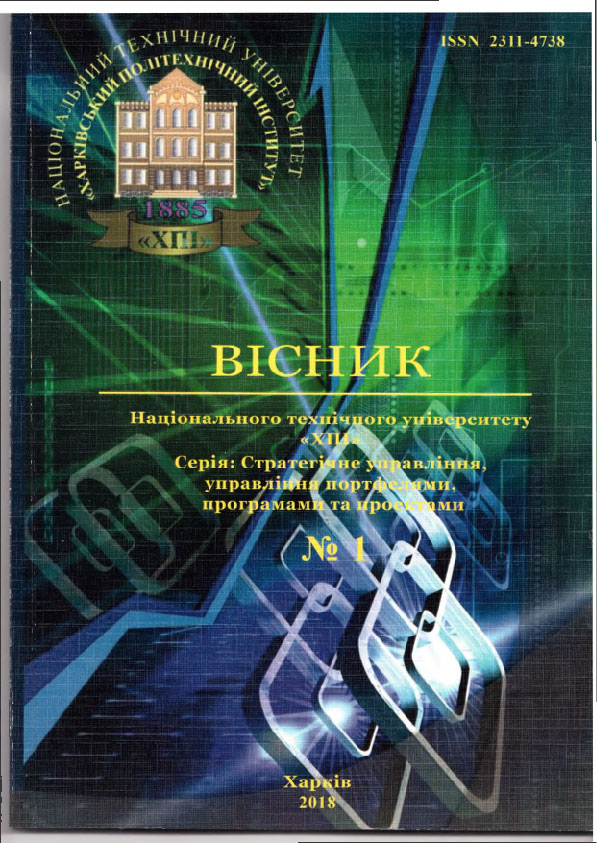BREAKTHROUGH COMPETENCIES IN THE MANAGEMENT OF INNOVATIVE PROJECTS AND PROGRAMS
DOI:
https://doi.org/10.20998/2413-3000.2018.1277.1Keywords:
project success, model, entrepreneurship, context, organization development, breakthrough competence, innovative projectsAbstract
The success of breakthrough projects and programs depends on two groups of factors: (i) the competence of organizations in managing of this projects and programs; (ii) ―Entrepreneurial spirit (energy)‖ that is formed by the leadership of the organization successful completion of the breakthrough projects. The success of the breakthrough project, as a management category, has contradictions which are formed as a result of different views of the interested parties. Thus, each of the key interested party has its level of competence in project management and may have opposing views on the success of the projects and their products and a new benchmark. The entrepreneurial energy of various interested parties promoting the breakthrough project contains contradictions which are to be accounted for by the organization‘s leadership and emotion intelligence in project management processes. Entrepreneurial energy depends on ―entrepreneurial capability‖ available in the organization and the key interested parties. It is a set of orientations for success, individual and collective responsibility, cognitive capability, Emotion intelligence, freedom of expression and creativity. Entrepreneurial capabilities are a socio-determined set of features for organizing and operating a business, which entrepreneurs could possess. The business often breakthrough capabilities are characterized by such properties as efforts to promote innovations, forms of implementation of the role function, the final product of economic creativity, ability to take risks, creativity, leadership ability as an entrepreneur, and individual psychological characteristics of the entrepreneur as management skills, independence in the selection and decision-making ability to respond to changes in the economic and social situation. Summing up all these definitions in the category of breakthrough concepts and tools for project management, we should note that the entrepreneurial capabilities determine the maturity or organizational competence in the management of projects, programs and portfolios of projects.References
P2M: A guidebook of Program & Project Management for Enterprise Innovation. 3rd ed. Japan, Project Management Association of Japan, 2015. 366 p.
Individual Competence Baseline for Project, Programme & Portfolio Management. 4th ed. International Project Management Association, 2015. 415 p.
Neizvesny S., Haritonov D. A., Rogozina V. B. Algebra Project Management methodologies based on genomic model. Managing the development of folding systems. 2013, no. 15, pp. 46–48.
Bushuyev S. D., Kharitonov D. A., Rogozina V. B. Organizational Project Management pathology. Managing the development of folding systems. 2012, no 10, pp. 5–8.
Bushuyev S. D., Bushueva N. S., Babayev I. A., Yakovenko V. B., Grisha E. V., Dzyuba S. V., Voitenko A. S. Creative project management technologies and programs: monograph. Kyiv, Summit book, 2010. 768 p.
Bushuyev S. D., Wagner R. F. IPMA Delta and IPMA Organisational Competence Baseline (OCB): New approaches in the field of project management maturity. International Journal of Managing Projects in Business. 2014, vol. 7, iss. 2, pp. 302–310. doi : 10.1108/ijmpb-10-2013-0049
IPMA Organisational Competence Baseline (IPMA OCB). IPMA, 2013. 67 p. doi : /10.1108/ijmpb-10-2013-0049
Global alliance for project performance standards. Available at: http://www.globalpmstandards.org/ doi.org/10.1524/9783486851144.339
Bushuyev S. D., Bushuev D. A., Jaroshenko R. F. Organization Development Projects Management Driving by Entrepreneurship Energy. Serbian Project Management Journal. 2016, vol. 6, iss. 2, pp. 12-16.
Forsberg K., Mooz H., Cotterman H. Visualizing Project Management. 3rd ed. New York, John Wiley and Sons, 2005, pp. 108–116, 242–248, 341–360.
Slivitsky А. Value migration. Маnn,Ivanov& Ferber, 2006. 432 p. doi : 10.4135/9781452229805.n683.
Bushuyev S., Bushuiev D. Emotional Intelligence – The Driver of Development of Breakthrough Competences of the Project. Proceedings 30th IPMA World Congress “Breakthrough competences for managing change”. Astana, Kazakhstan, 2017, pp. 8-14.
Bushuyev S., Murzabekova A., Murzabekova S., Khusainova M. Develop Breakthrough Competence of Project Managers Based on Entrepreneurship Energy. Proceedings 30th IPMA World Congress “Breakthrough competences for managing change”. Astana, Kazakhstan, 2017, pp. 21-28.
Downloads
Published
Issue
Section
License
Copyright (c) 2018 Сергій Дмитрович Бушуєв, Денис Антонович Бушуєв, Руслан Федорович Ярошенко

This work is licensed under a Creative Commons Attribution-NonCommercial-ShareAlike 4.0 International License.
Our journal abides by the Creative Commons copyright rights and permissions for open access journals.
Authors who publish with this journal agree to the following terms:
Authors hold the copyright without restrictions and grant the journal right of first publication with the work simultaneously licensed under a Creative Commons Attribution-NonCommercial-ShareAlike 4.0 International License (CC BY-NC-SA 4.0) that allows others to share the work with an acknowledgement of the work's authorship and initial publication in this journal.
Authors are able to enter into separate, additional contractual arrangements for the non-commercial and non-exclusive distribution of the journal's published version of the work (e.g., post it to an institutional repository or publish it in a book), with an acknowledgement of its initial publication in this journal.
Authors are permitted and encouraged to post their published work online (e.g., in institutional repositories or on their website) as it can lead to productive exchanges, as well as earlier and greater citation of published work.

